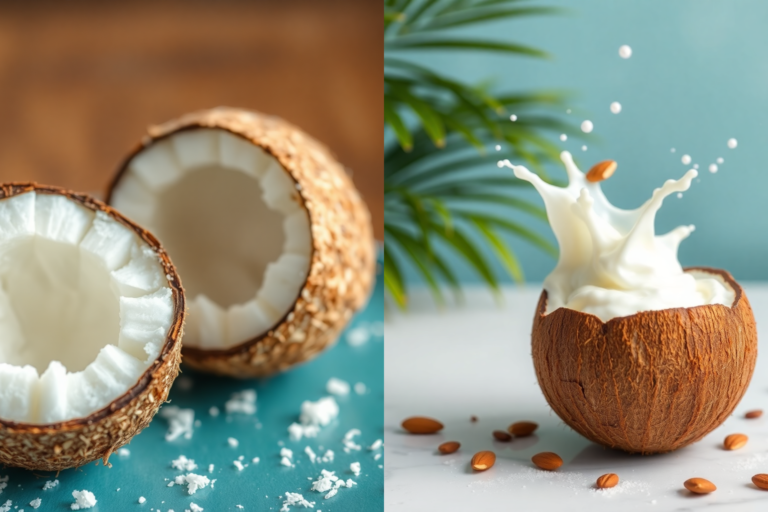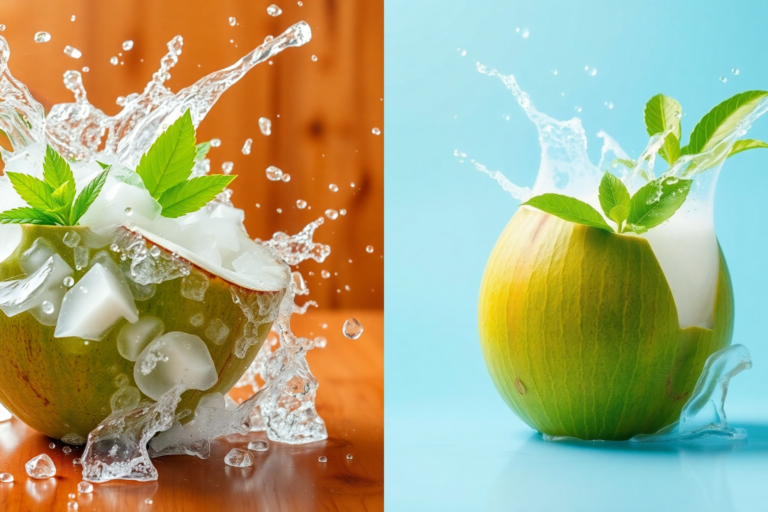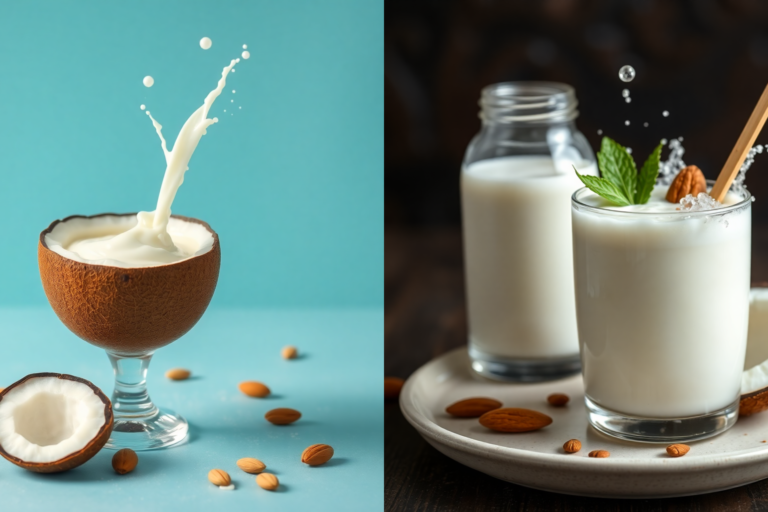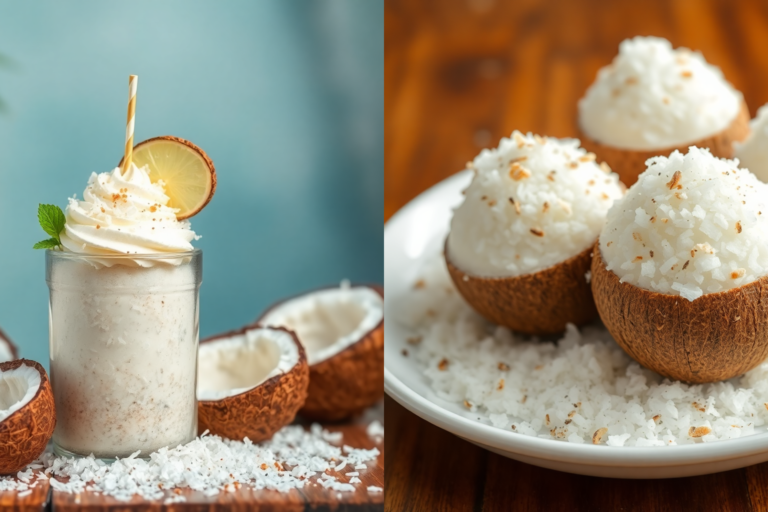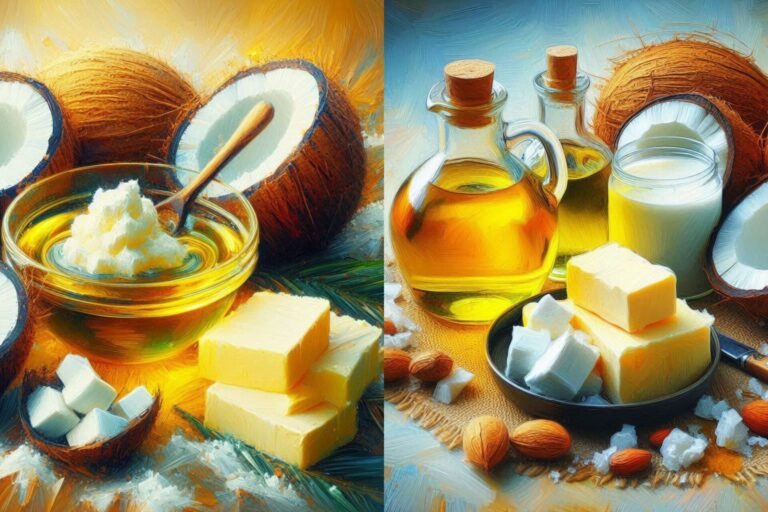Introduction: Coconut Butter vs Coconut Oil
Coconut Butter vs Coconut Oil: An Overview
Coconut butter and coconut oil are both derived from the coconut fruit, yet they have distinct differences in composition, uses, and benefits. While both are highly popular for their health and skincare properties, it’s essential to understand the nuances between the two to choose the right one for your needs.
What Is Coconut Butter?
Coconut butter is made by blending dried coconut meat, also known as copra, into a smooth paste. It contains both the oil and the solid parts of the coconut, offering a creamy, dense texture. Unlike coconut oil, which is purely oil, coconut butter has a higher fiber content and offers a more substantial consistency. This makes it excellent for use in cooking, baking, and as a base for homemade body scrubs and moisturizers.
What Is Coconut Oil?
Coconut oil, on the other hand, is extracted from the fresh meat of the coconut. It’s mostly oil with a slight amount of moisture and can be used in both cooking and beauty routines. Coconut oil is favored for its smooth texture, neutral flavor, and high content of medium-chain fatty acids (MCTs), which are believed to promote various health benefits such as weight loss and improved brain function. It is also rich in lauric acid, a compound with antibacterial and antiviral properties.
Coconut Butter vs Coconut Oil in Skincare
Both coconut butter and coconut oil have gained widespread popularity in skincare routines due to their nourishing, moisturizing, and healing properties. They are often used in natural beauty products like lotions, creams, and lip balms.
Coconut Butter in Skincare: Due to its creamy texture, coconut butter is particularly effective at moisturizing and softening dry skin. It’s packed with antioxidants and vitamins, such as Vitamin E, which help to protect the skin from environmental damage. Its higher fat content makes it ideal for nourishing the skin deeply, providing long-lasting hydration.
Coconut Oil in Skincare: Coconut oil, with its lighter consistency, absorbs easily into the skin, making it perfect for daily use. Its antibacterial properties are beneficial for treating acne-prone skin, and it is often used to remove makeup, moisturize, or treat eczema and psoriasis.
Coconut Butter vs Coconut Oil: Key Differences and Benefits
Coconut Butter vs Coconut Oil: Texture and Use
Coconut Butter: Rich and creamy, coconut butter is perfect for those seeking a thicker, more indulgent option for skin hydration. It’s ideal for dry patches, cracked heels, and rough elbows.
Coconut Oil: Coconut oil is a versatile, light oil that can be used not just in skincare but in cooking, haircare, and even for oil pulling. Its smooth texture allows it to be easily spread across the skin without feeling too heavy.
Coconut Butter vs Coconut Oil: Nutritional and Skincare Benefits
Coconut Butter: Due to its fiber content, coconut butter can help in digestion and gut health when consumed. In skincare, it provides long-lasting moisture and can help with inflammation or eczema.
Coconut Oil: The primary benefit of coconut oil lies in its high concentration of medium-chain fatty acids (MCFAs), which are known for their ability to provide quick energy and improve metabolism. It also serves as an excellent natural antimicrobial agent.
Definition and Extraction Process
Coconut butter is a rich, creamy spread made from the flesh of coconuts. Unlike coconut oil, which is extracted by pressing the oil from coconut meat, coconut butter is made by blending the whole coconut, including its oil and fiber, into a smooth paste. This results in a thick, buttery texture that retains the natural sweetness and aroma of coconut.
The extraction process begins by drying the coconut meat, then grinding it until it forms a thick, spreadable consistency. This process ensures that all parts of the coconut are utilized, making coconut butter a more holistic product compared to coconut oil.
Nutritional and Skincare Benefits
Coconut butter is not just a flavorful addition to your pantry but also a powerhouse of nutrients. It contains healthy fats, particularly medium-chain triglycerides (MCTs), which are known for their quick energy release and metabolism-boosting properties. Additionally, coconut butter provides fiber, iron, potassium, and magnesium, contributing to a balanced diet.
In skincare, coconut butter is valued for its moisturizing properties. It deeply nourishes the skin, helping to retain moisture and improve skin elasticity. It’s often used in DIY skincare recipes, such as body scrubs and moisturizers, due to its natural ability to soothe dry, flaky skin.
Coconut Butter vs Coconut Oil
Understanding the Differences
When comparing Coconut Butter vs Coconut Oil, the primary distinction lies in their composition. While coconut oil is purely fat, coconut butter includes the entire coconut flesh, providing additional fiber and nutrients. This makes coconut butter a more nutrient-dense option, though both products share similar health benefits due to their MCT content.
In cooking, Coconut Butter vs Coconut Oil have different uses. Coconut oil is commonly used for frying and sautéing due to its higher smoke point, whereas coconut butter is better suited for baking, spreading, or blending into smoothies and sauces for added flavor and texture.
Skincare Applications: Coconut Butter vs Coconut Oil
Both coconut butter and coconut oil are excellent for skincare, but their applications differ slightly. Coconut Butter vs Coconut Oil in skincare shows that while coconut oil is often used for its lightweight, quick-absorbing properties, coconut butter, being thicker and richer, provides deeper hydration. This makes coconut butter ideal for intensive moisturizing treatments, especially for dry or sensitive skin.
Coconut Butter vs Coconut Oil: What is Coconut Oil?
Definition and Extraction Process
Coconut Butter vs Coconut Oil is a topic often discussed among health and skincare enthusiasts. Coconut oil is extracted from the meat of mature coconuts. The process involves cold pressing or using heat to extract the oil, which can then be refined or left in its virgin state. Virgin coconut oil retains more nutrients and has a stronger coconut flavor compared to refined coconut oil, which undergoes further processing to remove impurities.
Nutritional Benefits
When comparing Coconut Butter vs Coconut Oil, it’s important to consider their nutritional profiles. Coconut oil is rich in medium-chain triglycerides (MCTs), which are believed to be easier for the body to metabolize, potentially providing a quick source of energy. It also contains lauric acid, known for its antimicrobial properties. Including coconut oil in your diet can contribute to better digestion, improved cholesterol levels, and enhanced brain function.
Skincare Benefits
The debate between Coconut Butter vs Coconut Oil extends into skincare routines. Coconut oil is highly praised for its moisturizing properties. It’s an excellent natural emollient, helping to soothe dry skin, reduce inflammation, and promote healing. The oil can be used as a makeup remover, hair conditioner, and even as a base for DIY skincare products. Its antimicrobial properties make it a popular choice for combating acne and skin infections.
Coconut Butter vs Coconut Oil: Key Differences
Texture and Consistency
Understanding the Texture of Coconut Butter vs Coconut Oil
Coconut Butter vs Coconut Oil presents a noticeable difference in texture and consistency. Coconut butter is thick and creamy, containing the coconut flesh, which gives it a grainy texture. In contrast, coconut oil is smooth and liquid at room temperature, solidifying in cooler conditions. The presence of coconut meat in coconut butter makes it dense, whereas coconut oil, extracted from the meat, is purely the fat, making it lighter and more fluid.
Culinary Uses Based on Texture
When considering Coconut Butter vs Coconut Oil for cooking, the texture plays a vital role. Coconut butter’s thick consistency makes it ideal for spreads, smoothies, and desserts. Coconut oil, with its smooth texture, is perfect for frying, baking, and sautéing, offering a neutral base that blends well with other ingredients.
Absorption Rate on the Skin
How Coconut Butter vs Coconut Oil Absorbs Into the Skin
Coconut Butter vs Coconut Oil differs significantly in their absorption rates when applied to the skin. Coconut oil is quickly absorbed, leaving the skin feeling soft and non-greasy. Its light texture allows it to penetrate deeply, making it an excellent moisturizer. On the other hand, coconut butter, due to its thicker consistency, sits on the skin longer, providing a protective barrier that locks in moisture, which is beneficial for very dry skin.
Benefits in Skincare
The choice between Coconut Butter vs Coconut Oil in skincare depends on the desired effect. Coconut oil is preferred for daily moisturizing, especially for those with normal to oily skin, as it doesn’t clog pores. Coconut butter, being heavier, is more suited for intensive moisture treatments and dry skin areas, offering prolonged hydration.
Key Components and Nutrients
Nutritional Profile of Coconut Butter vs Coconut Oil
Coconut Butter vs Coconut Oil varies in their nutritional composition. Coconut butter contains the whole coconut, including fiber, protein, and essential vitamins like C and E, making it a nutrient-dense option. Coconut oil, however, is primarily composed of saturated fats, specifically medium-chain triglycerides (MCTs), which are known for quick energy release and potential weight management benefits.
Health Implications
When evaluating Coconut Butter vs Coconut Oil for health benefits, it’s essential to consider their unique components. Coconut butter provides a broader spectrum of nutrients, making it a healthier option for those seeking a whole food source. Coconut oil, rich in MCTs, is beneficial for individuals looking for a quick energy boost and improved cognitive function.
Coconut Butter vs Coconut Oil: Which is Best for Your Skin?
Coconut Butter vs Coconut Oil for Dry Skin
Benefits of Coconut Butter
Coconut butter is a fantastic choice for individuals with dry skin due to its rich and creamy texture. Packed with natural oils, coconut butter deeply moisturizes and nourishes the skin, helping to restore its natural lipid barrier. It contains essential fatty acids that are crucial for maintaining hydration, making it an ideal solution for flaky or parched skin. By using coconut butter regularly, you can achieve smoother, softer skin that feels well-hydrated throughout the day.
Benefits of Coconut Oil
While coconut oil is also beneficial for dry skin, it is lighter in texture compared to coconut butter. Coconut oil penetrates the skin quickly, providing immediate relief to dryness without leaving a greasy residue. It contains lauric acid, which has antimicrobial properties, making it helpful in preventing infections that can occur due to cracked or irritated skin. For those seeking a quick-absorbing moisturizer, coconut oil is a great option.
Coconut Butter vs Coconut Oil for Oily Skin
Benefits of Coconut Oil
Contrary to popular belief, coconut oil can be beneficial for oily skin when used in moderation. Coconut oil helps to balance the skin’s natural oil production and can reduce the appearance of excess shine. Its antimicrobial properties also help combat acne-causing bacteria, making it a suitable option for individuals with oily, acne-prone skin. However, it is essential to use coconut oil sparingly to avoid clogging pores.
Benefits of Coconut Butter
Coconut butter is generally too heavy for oily skin types, as it can exacerbate oiliness and potentially lead to clogged pores. While it is excellent for providing deep hydration, those with oily skin should opt for lighter alternatives, like coconut oil, to avoid an overly greasy feel.
Considerations for Sensitive Skin
Coconut Butter vs Coconut Oil for Sensitive Skin
Sensitive skin requires gentle care, and both coconut butter and coconut oil can be suitable, depending on the individual’s tolerance. Coconut butter, with its thick consistency, can provide a soothing and protective barrier for sensitive skin, especially in harsh weather conditions. However, due to its heavier nature, it might not be suitable for everyday use on sensitive skin prone to breakouts.
Coconut oil, being lighter, is often preferred for sensitive skin as it is less likely to clog pores and cause irritation. Its anti-inflammatory properties can help soothe redness and irritation, making it a gentle option for daily moisturizing.
How to Use Coconut Butter and Coconut Oil in Skincare
Coconut butter and coconut oil are two versatile and nourishing ingredients that have become staples in natural skincare. Both have unique properties that can enhance your beauty routine, offering moisturizing and protective benefits for your skin. This guide will explore the differences and similarities between Coconut Butter vs Coconut Oil, and provide DIY skincare recipes to incorporate them into your daily regimen.
Coconut Butter vs Coconut Oil: Understanding the Basics
What is Coconut Butter?
Coconut butter is made from the whole coconut flesh, which is pureed into a thick, creamy substance. It retains the fiber and essential nutrients found in coconut meat, making it a rich and nourishing option for skincare.
What is Coconut Oil?
Coconut oil, on the other hand, is extracted from the coconut meat, primarily consisting of the oil content. It is known for its lightweight texture and deep moisturizing properties, making it a popular choice for various skincare applications.
DIY Skincare Recipes with Coconut Butter and Coconut Oil
1. Coconut Butter Body Lotion
Ingredients:
1/2 cup coconut butter
1/4 cup coconut oil
2 tablespoons shea butter
10 drops of essential oil (optional)
Instructions:
Melt the coconut butter, coconut oil, and shea butter in a double boiler.
Once melted, remove from heat and let it cool slightly.
Add essential oil and whip the mixture until it reaches a creamy consistency.
Transfer to a jar and use as a nourishing body lotion to keep your skin soft and hydrated.
2. Coconut Oil Face Cleanser
Ingredients:
2 tablespoons coconut oil
1 tablespoon castor oil
A few drops of your favorite essential oil (optional)
Instructions:
Mix coconut oil and castor oil in a small bowl.
Apply a small amount to your face and massage gently for a few minutes.
Use a warm, damp cloth to wipe away the oil, leaving your skin clean and moisturized.
3. Coconut Butter Lip Balm
Ingredients:
2 tablespoons coconut butter
1 tablespoon beeswax pellets
1 tablespoon coconut oil
5 drops of peppermint essential oil (optional)
Instructions:
Melt the coconut butter, coconut oil, and beeswax in a double boiler.
Once fully melted, add the peppermint essential oil and mix well.
Pour the mixture into lip balm containers and let it set.
Use regularly to keep your lips soft and moisturized.
How to Incorporate Coconut Butter and Coconut Oil into Your Routine
Moisturizing with Coconut Butter
Coconut butter can be used as a daily moisturizer for the body. Its rich texture makes it ideal for dry or sensitive skin. Simply apply a small amount to your skin after a shower to lock in moisture and keep your skin soft throughout the day.
Cleansing with Coconut Oil
Coconut oil is an excellent natural cleanser, especially for removing makeup. Its antibacterial properties help keep your skin clear while providing deep hydration. Use it in your evening routine to cleanse your face, followed by a warm towel to remove excess oil.
Exfoliating Scrubs
Create a natural exfoliating scrub by mixing coconut oil with sugar or salt. This combination gently removes dead skin cells, revealing smoother and more radiant skin.






